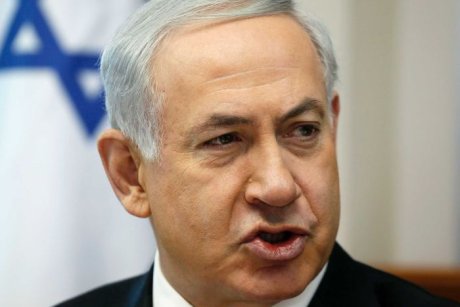Israel’s Prime Minister Benjamin Netanyahu seeks immunity from prosecution on corruption charges

Israel’s prime minister Benjamin Netanyahu
Mr Netanyahu was indicted in November on charges of bribery, fraud and breach of trust.
Israel’s Prime Minister Benjamin Netanyahu has said he will ask Parliament to protect him from prosecution in the three graft cases he faces, a politically risky move that could delay criminal proceedings against him for months.
Key points:
A trial cannot get under way once an immunity request is made
If immunity is granted, Israel’s Supreme Court is empowered to review the decision
Mr Netanyahu failed to assemble a governing majority in back-to-back elections last year
Mr Netanyahu was indicted in November on charges of bribery, fraud and breach of trust over allegations he granted state favours worth hundreds of millions of dollars to Israeli media barons in return for gifts and favourable coverage.
He denied any wrongdoing, saying he was the victim of a witch hunt by the left and the media who were seeking to oust a popular right-wing leader.
“In order to continue to lead Israel to great achievements, I intend to approach the speaker of the Knesset in accordance with chapter 4C of the law, in order to fulfil my right, my duty and my mission to continue to serve you for the future of Israel,” Mr Netanyahu said during a televised announcement on Wednesday.
After failing to assemble a governing majority following back-to-back elections last year, Mr Netanyahu will get a third shot at remaining in office in March.
Normally, a request for immunity would need to be approved by the Parliament’s House Committee and then submitted to a full vote. But the House Committee doesn’t exist because a government was never formed after September’s election.
The announcement essentially turns the upcoming election into a referendum on whether Mr Netanyahu should be granted immunity and remain in office, or step down and stand trial.
‘Everyone is equal before the law’
A trial cannot get under way once an immunity request is made.

Mr Netanyahu announced the move in a speech on live television just four hours before a deadline for an application was to expire.
Is Netanyahu’s time running out?
Israeli Prime Minister Benjamin Netanyahu is at the top of his political game. But all of that could be undone by police, who have been investigating two corruption cases on the veteran leader.
Had Mr Netanyahu not filed the request by Wednesday’s deadline, the indictment against him could have been submitted to a court as early as Sunday (January 5), setting proceedings in motion.
Responding to Mr Netanyahu’s speech, his main rival, Benny Gantz, a former armed forces chief who heads the centrist Blue and White party, said the Prime Minister was “jeopardizing the civic principle upon which we were all educated — that everyone is equal before the law”.
“I never imagined that I would see the day that a prime minister wouldn’t care about the future of the state of Israel, rather only about himself and his individual fate,” he said.
“Today it’s clear what we’re fighting for. Netanyahu knows he’s guilty.”
If immunity is ultimately granted — entitling Mr Netanyahu to avoid standing trial as long as he is a Member of Parliament — Israel’s Supreme Court is empowered to review the decision and strike it down.
A recent poll indicated that a majority of Israelis opposed giving him immunity.



